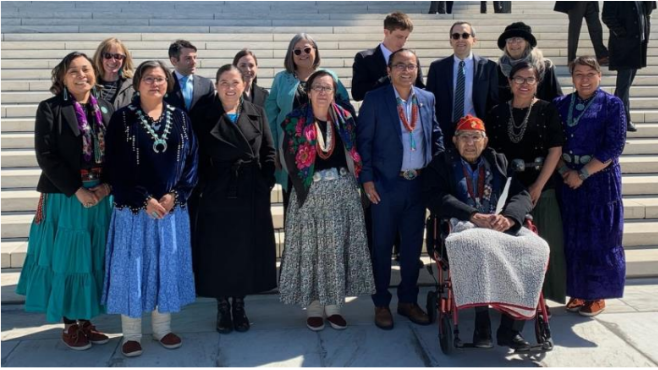NAVAJO NATION WATER RIGHTS INTACT AFTER SCOTUS RULING
Supreme Court’s decision opens opportunities for litigation, legislation to secure water claims
June 29th, 2023

(Navajo Nation officials, legal team, and elder statesman at the Supreme Court after oral arguments in Arizona v. Navajo Nation) Photo Credit: Navajo Nation Department of Justice
WINDOW ROCK, NAVAJO NATION – Thursday, June 29, 2023—Last week’s Supreme Court decision in Arizona et al. v. Navajo Nation did not give the relief the Nation sought, which was a modest request for the United States to assess the Nation’s water needs and develop a plan to meet them. The decision does not take away from or touch upon any of the Nation’s existing water rights. In fact, the decision made key points that give the Nation additional options moving forward to secure a future claim to water from the Colorado River to support future generations of Navajo communities, agriculture and livestock.
“The Supreme Court’s ruling does not say that we have lost any water rights; our water rights remain intact. In this case, we simply asked the United States as trustee to help the Navajo Nation quantify how much water the Navajo people have a right to, and they turned us away,” said Navajo Nation President Buu Nygren. “Water is sacred to the Navajo people, and it is needed in all areas of development. For the Navajo Nation to develop and prosper, and meet the needs of our growing population, we need to know how much water we have access to.”
The 5-4 decision held that the Navajo’s 1849 and 1868 Treaties do not require the United States to take “affirmative steps” to secure water for the Nation. However, the decision made an important acknowledgement – it agreed that the government holds water rights in trust for the Navajo Nation, which is critical to future water claims.
“We want to tell the Navajo people that our claim to rights of the Colorado River were not lost in the ruling. It is important that we stay positive as leadership even though we are put back in a familiar position as Navajo people have been urging this reconciliation for years. If anything, this ruling motivates us to get back in the fight for our homelands and claims to water,” said Navajo Nation Council Speaker Crystalyne Curley.
Though the Court’s decision may seem devastating to the Nation’s water rights, it actually gave the Nation options to pursue by upholding Winters v. United States, the bedrock of federal Indian water law. The majority’s opinion left open the possibility that the Nation can intervene in future water-rights litigation that “affect their claimed interests” – an avenue the Nation is currently exploring.
“Now more than ever we will redouble our efforts to firm the Nation’s rights to water so that our Arizona lands will see water flowing to even the most remote of Navajo homes. We will explore all our options, including additional litigation and legislation, but settlement is our primary pathway forward in this quest. We will continue to drive the pace of those discussions so we are able to secure the water needed for the vibrant Navajo Nation permanent homeland and future that our ancestors envisioned and negotiated to preserve in our treaties,” stated Navajo Nation Attorney General Ethel Branch.
Under the Winters Doctrine, the Nation has rights to all the water necessary to meet both the past and future needs of its Reservation, with certain caveats. It has been more than a century since the Supreme Court decided Winters, and the Nation’s water rights in Arizona have not been decided by any court.
Justice Gorsuch states in his dissent that the Navajo "have a simple ask: They want the United States to identify the water rights it holds for them. And if the United States has misappropriated the Navajo's water rights, the Tribe asks it to formulate a plan to stop doing so prospectively."
“It is important for the Navajo people and Indian Country to know the Court’s ruling did not harm any actual water rights claims or settlements of the Nation, and does not have any effect on the Nation’s water rights to the Colorado River or other water sources. It also does not deter the Nation from continuing our fight to hold the United States accountable for assessing the available water supply,” said Michelle Brown-Yazzie, Assistant Attorney General for the Navajo Nation Department of Justice’s Water Rights Unit.
Approximately 40% of Navajo Nation homes lack access to running water. Navajo families continue to haul water, often off reservation, from unsanitary sources and at a high cost. Lack of adequate water supplies on the Navajo Nation contributed significantly to the disproportionately adverse impact of the COVID-19 pandemic on the Navajo Nation, where at times the infection rate on the Nation exceeded everywhere else in the country. These abject deficiencies stand in stark contrast to most homes in the United States that rely on indoor plumbing and running water as basic, 21st century amenities.
In the dissenting opinion, Justice Gorsuch summarized that, “as [the Navajo Nation] did at Bosque Redondo, they must again fight for themselves to secure their homeland and all that must necessarily come with it. Perhaps here, as there, some measure of justice will prevail in the end.”